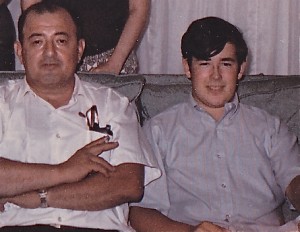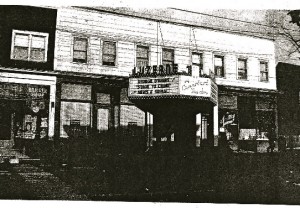
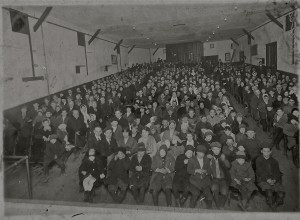
The interior of the Luzerne Theatre sometime around late 1925 or early 1926. Click on image to enlarge. In this rather detailed photograph, look at the expressions on some of the faces of the children near the front. Was it something exciting on screen?
The Luzerne Theatre opened in 1925 initially as a silent house. Thomas Alexander and Louis Marinos Sr. built the theatre in conjunction with the Comerford Corporation. When the theatre opened, it had a large organ near the screen. Sixteen year old Margaret Alexander (Politis), Alexander’s oldest child, a musical prodigy, often played the scores to the films which were supplied on music paper by the film companies.
In one instance, the complex score to the highly anticipated Phantom of the Opera starring Lon Chaney arrived just minutes before the premier showing. Margaret sight read and performed the entire score live without having the opportunity to review it beforehand. “I played that one cold,” she recalled years later. The packed house erupted into applause, and she was presented with a bouquet of flowers by the town’s mayor.
A sound system was added in early 1928 to accommodate the increasing number of “talkies,” but the organ remained to provide entertainment between movies for a couple more years. By 1930 with the Great Depression raging on, the Luzerne Theatre was part of the Paramount-Publix Corporation’s buyout of most of the Alexander/Marinos Theatres. The marquee still read “A Comerford Theatre” as the Comerford Corporation chose not to sell their half.
Eventually, Comerford bought out Paramount-Publix’s interests and owned the theatre solely. But the Luzerne Theatre was struggling due to poor management. In the mid 1930’s Alexander’s eldest son Alec was the assistant manager at Comerford’s Capitol Theatre in Wilkes-Barre. M.E. Comerford asked him to step in and take over management of the Luzerne Theatre. Alec Alexander soon discovered that the main reason the theatre was failing was because the previous manager Comerford had hired was essentially trading out movie passes for services and products from local business owners. Very little cash was coming into the box office. Alexander stopped this policy immediately and restored the Luzerne Theatre to a money making venue and one of Comerford’s most successful theatres in Wyoming Valley.
It was this new position at Luzerne that led to the decision to build the Forty Fort Theatre.
Alec relayed the story in a 1992 interview:
(interview info coming)
Alec left Luzerne in the fall of 1936 and later stated that partnering with the Comerfords and working for the Comerfords presented two very different scenarios. He approached his father Thomas Alexander about coming out of retirement and getting back into the theatre business as owners, not employees. Thomas Alexander told Alec that he had always wanted to build a theatre in Forty Fort. And in 1936, ground was broken on Wyoming Avenue to build the Forty Fort Theatre.
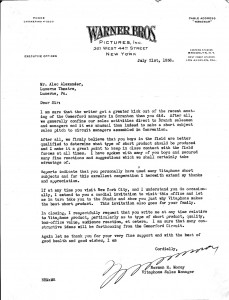
An invitation to Luzerne Theatre manager Alec Alexander from Warner Bros. to visit the east coast studios. (click on image to enlarge)
Ed Note: We tracked down an interesting reference to Norman H. Moray, the author of the above correspondence with Alec Alexander. Moray is briefly discussed in the book, “Confessions of a Hollywood Director” by Richard L. Bare near the bottom of page 129.
The Luzerne Theatre continued under the ownership of the Comerford Corporation until 1955 when the Alexander family repurchased it. During the late 1950’s the borough of Luzerne had threatened an entertainment tax on not only the theatre but bars, restaurants and pool rooms. Alec Alexander told the borough council that if the tax was passed, he would close the theatre. They called his bluff – and he immediately closed the the theatre as promised. It was dark for nearly six months. The tax was extremely unpopular with the citizens of Luzerne and it was repealed. The theatre reopened almost immediately after the tax was lifted.
Alec’s brother Frank took over management of the theatre along with the youngest Alexander brother, Taki. By the time the 1960’s rolled around, the theatre tried various promotions common during the day like “dish night.”
Around 1967, the Luzerne Theatre had established itself as an art and foreign film house, frequently mixing the films of Bergman and Fellini with contemporary American motion pictures. Around this time, Frank’s son Thomas F. Alexander joined his father in running the theatre.
In the late 60’s, the Luzerne Theatre was the place to go for alternative entertainment. But it all ended suddenly on Memorial Day 1969 when hot ashes from a burn barrel landed on the roof of a connecting apartment building. The theatre and the entire block were completely destroyed by the blaze. However, a cinderblock wall of the old theatre still stands. The theatre housed hundreds upon hundreds of classic movie posters and memorabilia dating as far back as the silent age, all of which were lost forever.
Coincidentally, just days before the fire, Frank Alexander had suffered a heart attack and was hospitalized. His brothers waited until he was well enough before breaking the news of the fire to him. After regaining his strength, Frank continued to operate Alexander Brother’s Coffee until 1972. He also co-owned and remained on at the Forty Fort Theatre.
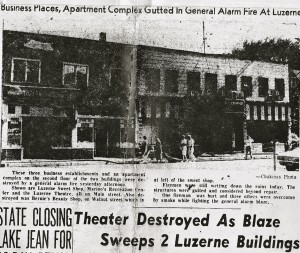
This newspaper clipping from the Wilkes-Barre Record the day after the fire that destroyed the Luzerne Theatre. (Click photo to enlarge)

